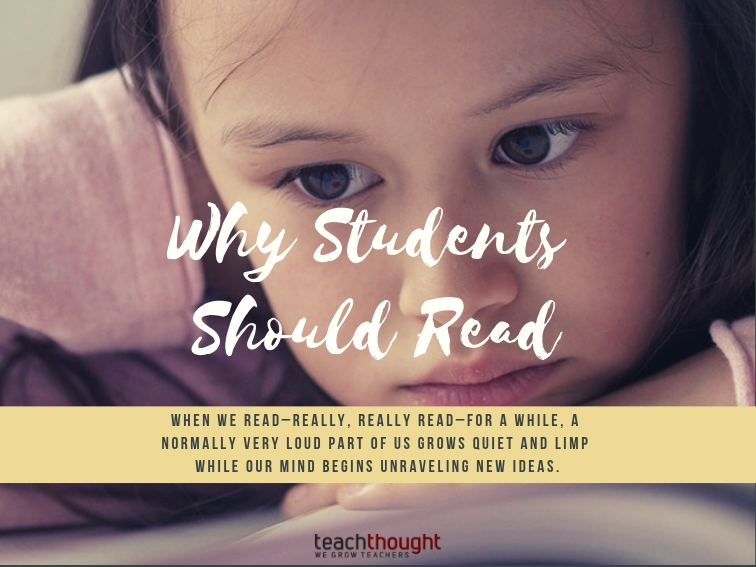Why Should Students Read?
by Terry Heick
Lately, there’s something about reading that’s bothering me about how we teach reading and writing.
I’ve written about it before and said a lot of what I say here, but never quite said what I was trying to say because I’m not sure what I really mean. It’s got something to do with how schools frame it. Call it ‘literacy.’ Sterilize it. Cleave it cleanly from its human contexts until it’s a school thing and good for you and you should totally do it and one day you’ll be thankful you did.
Like flossing.
Decoding & Comprehension
Reading, as taught, is a skill.
This is partly by definition. The word reading represents a slew of ideas. It’s a verb, but it’s such a familiar idea and outwardly passive process that it works almost like a noun. Reading can create a kind of flow state where the consciousness of the reader merges with that of the writer through the text.
And when this happens, all three can kind of disappear. There is no reader, no writer, and no text, but rather simply a mind dancing with ideas while the world falls away. But that’s a best-case scenario and disgustingly romantic and not what I mean to say either.
So then, education. As a matter of teaching and learning, reading is absolutely iconic. To teach reading requires us–teachers–to break it down into parts, usually somewhere along the fault lines of decoding and comprehension.
See also A Conversion Chart For Reading Level Measurement Tools
The decoding part is a mix of letters and sounds. Digraphs, clumsy blends, irregular words, and pattern recognition. Phonemics. It’s literally learning to speak a new language, one made with alphanumeric characters on paper (that can travel through time) instead of sounds with your mouth. It begins and ends in your brain and if you can internalize it, ends up in your mind.
Comprehension, however, is somewhere close to your stomach. It’s more metacognitive and personal, where the reader takes the internalized symbols and, leveraging their own schema and background knowledge, turns the symbols into something they can recognize and their soul winks and spins. This is a person making meaning. How crazy is that? When a teacher, then, seeks to teach reading, they have to make a choice: Teach decoding, teach comprehension, or try to merge both.
This, though, isn’t necessarily a problem. Or the problem as I’m trying to better understand. For all of its wonderful intentions, pedagogy is inherently destructive. Every student has a right to education, of course–but pedagogy itself seeks to change and reform and mash and refine and alter and reduce and increase. Put another way, focusing on reading-the-verb–the skill as assessed by reading speed and sight vocabulary and main idea extraction and author and purpose and details, and a million other silent efforts readers make in unfolding a text in a way that they can make some kind of sense of it–annihilates reading from the beginning in pursuit of a ‘highly-effective learning environment.’
The assumption is that if one can read, and read well, then they will. This is a useful microcosm that emphasizes how education can grow.
Consider:
Skills vs habits.
Competencies vs tendencies.
Abilities vs affections.
As a teacher and parent, I’m less interested in what children can do and am more interested in what they tend to do.
When we focus on teaching content rather than teaching the child, we lose the child. As it stands, we’re a curriculum-centered, data-driven, institutionally-focused industry, and our language reflects that approach. Progress. Acceptance. Rejection. Pass. Fail. Register. Enroll. Proficient. Assess. Data. When seeking improvement, we seek to improve how we’re doing what we’ve always done, but more of it–faster and more efficiently. We break the learner and their sense of self to fit in stuff. We seek to improve our collective processes to cause more learning, which makes as much sense as teaching students how to read but rarely why.
And that’s about as close as I thought I was going to get (for now) as to why literacy, as taught, is gnawing at me. I was going to end there with useless uncertainty but publish it anyway so I can read it later and shake my head. Until I read this quote from Franz Kafka on why we should read.
“I think we ought to read only the kind of books that wound or stab us. If the book we’re reading doesn’t wake us up with a blow to the head, what are we reading for? So that it will make us happy, as you write? Good Lord, we would be happy precisely if we had no books, and the kind of books that make us happy are the kind we could write ourselves if we had to. But we need books that affect us like a disaster, that grieve us deeply, like the death of someone we loved more than ourselves, like being banished into forests far from everyone, like a suicide. A book must be the axe for the frozen sea within us. That is my belief.”
When we read–really, really read–for a while, a normally very loud part of us grows quiet and limp while our mind begins unraveling new ideas. Then, pushing further, we look inward, turning our skin inside out to expose our pulsing, naked nerves to the text. We erect a sense of self to withstand the sheer momentum of the text, then rummage through the debris when it’s all over to see what’s left behind.
And what we find is who we are.
That’s why students should read.
Why Students Should Read; adapted image attribubtion flickr user wolfganglonien

